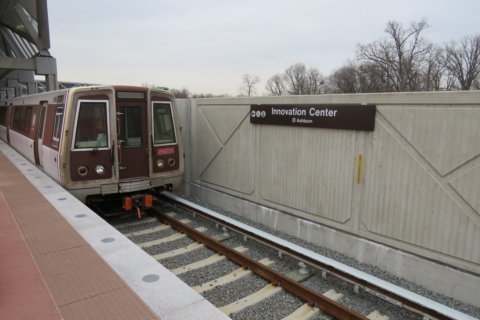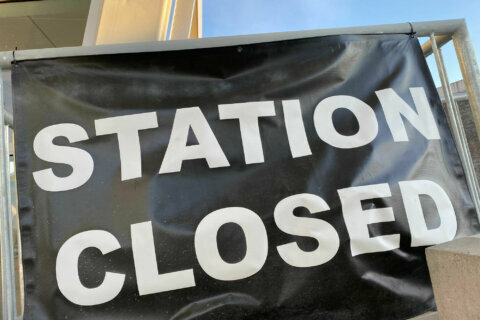A long-awaited report on Silver Line problems from Metro’s Office of Inspector General lays out a number of significant concerns with the extension to Dulles International Airport and Loudoun County, Virginia.
It leaves the ultimate decision on how to proceed to Metro leaders, doing little to clear up when the line might open.
“Additional areas of concern have risen during our review. Some of these concerns have already been the subject of intense consideration, and some less so,” the report said.
Software issues could add even more delays
Some of those issues include concerns about rail systems planning and quality control leading to a halt of tie-in work of the open Silver Line Phase 1 to the yet-to-open Phase 2.
Some of the serious signaling software concerns have been identified in a 2018 Airports Authority audit, but there were few changes made, the report found.
“The unresolved issues with ATC system acceptance requirements create the potential for even more schedule delay beyond what is already reported. Additionally, these deficiencies do not engender confidence in system safety,” the Metro inspector general’s report said.
Metro staff sent an additional letter expressing “higher levels of concern” in late January 2019, and a dispute remains between Metro and Airports Authority contractors over what Automatic Train Control documentation is needed.
The Metropolitan Washington Airports Authority just started a new audit of the signals systems program last week.
In addition, Metro has not seen required monthly testing reports, which the report notes makes oversight more difficult.
Some disputes over testing date back to 2016. Metro asked for a broad testing plan, while the Airports Authority and contractors have instead provided specific testing plans for each subcontractor’s systems they say meet requirements.
The Metropolitan Washington Airports Authority hired the various contractors building the Silver Line, but Metro will eventually take ownership and run the trains.
Capital Rail Constructors — the contracting group building the stations and main tracks — told WTOP it remains confident in the construction so far.
“CRC remains proud of the quality work we’ve delivered on the Silver Line project. We are reviewing the IG’s report and evaluating the analysis of the project,” Project Director Keith Couch said in a statement.
The Airports Authority and other contractors also remain confident the line is nearly ready to go and the current problems can be fixed in coming months.
The new report — released on Thursday — casts serious doubts on that.
“At this juncture, it is clear that MWAA does not have WMATA’s concurrence for acceptance of the Systems Integration Program Plan as required by the Cooperative Agreement. Without such concurrence, the requisite framework for observing and monitoring the quality and effectiveness of systems integration testing is made more difficult, if not wholly compromised,” the report said.
Metro does have its own requirements laid out for testing required before it takes over the line, but given all the problems, the report suggests Metro may want to add even more staff overseeing testing and tie-in work.
“The Airports Authority will continue to focus on safety, reliability and durability as the parties work together to complete the project in accordance with contract specifications and WMATA standards,” Airports Authority Dulles Rail Project spokeswoman Marcia McAllister said in an email.
“We are committed to delivering a quality rail line that will serve the traveling public for years to come,” McAllister wrote.
Metro GM will have to decide on the line
The inspector general’s report leaves the determination of acceptable fixes for the ongoing issues to Metro management, rather than taking specific positions on repairs.
It recommends Metro continue to push for more documentation, a sign the project could be in a lengthy holding pattern even as the stations and tracks sit essentially finished.
The report speaks for itself, Inspector General Geoff Cherrington said.
It leaves Metro General Manager Paul Wiedefeld to make his own decision, rather than publicly relying on others like the inspector general or Washington Metrorail Safety Commission to set black and white guidelines for how to move forward with the project.
“This independent review reinforces concerns we have raised for several years that have gone unresolved. We will continue to work closely with MWAA to ensure the system is turned over to Metro in the right condition to operate and maintain,” Wiedefeld said in a statement.
He recently projected the line is likely at least a year away from opening.
The report does lay out recommendations for how to address the issues.
“The OIG concludes that all of these issues derive from two major over-arching shortcomings: ineffectiveness and inconsistency of the Project Contractor’s Quality Management Program in resolving reported problem areas, and the absence of a single design-build systems integrator who views the core systems and infrastructure holistically,” the report stated.
The report does not cover concrete panel problems in detail, because the inspector general plans to release a separate report on those issues.
The concrete panels that frame stations and some rooms have been coated with sealant to keep water out. The office has hired a separate contractor to further investigate the concrete problems.
“OIG remains concerned about the expense and efficacy of currently proposed mitigations to the issue of cracks in the concrete panels,” the wide-ranging report said.
Metro Board Chairman Paul Smedberg urged the Airports Authority to act on the report to get fixes finished.
“Until these issues are addressed to our satisfaction, the Board cannot in good faith accept a Silver Line extension into the Metro system knowing that it will place an undue financial burden on the region,” Smedberg said in a statement.
The Airports Authority is looking at the recommendations.
“We are reviewing the report, which, as expected, covers a wide range of issues while offering recommendations that we hope will help the Airports Authority, WMATA and our contractors resolve the issues,” McAllister said.
Many issues to address
Other top issues relate to failures in quality management audits; a lack of focus on systems integration plans; trouble resolving issues that are documented as problems; ongoing rail yard track construction and other issues; and problems with plans for spare parts.
The report also finds surge arresters — meant to protect electrical equipment — were installed on a project that was not rated for Metro’s 750 volt power supply.
Some concerns raised by Metro were never incorporated into lists of things needed to be fixed, and certain problems were closed out without clear fixes, or a full understanding of why the issues arose.
In the rail yard, problems with the rock ballast supporting the tracks have been documented for years. Metro just sent another letter to the Airports Authority last week describing problems in more than a quarter of the ballast tested and requiring fixes for a significant part of the yard.
More work is also needed at switches in the rail yard, and there are possible safety and fire code violations at the gas pumps for Metro vehicles in the rail yard.
“While the cost to build the Fuel Center is small in comparison to the Rail Yard costs, the provision of a fueling center without proper safeguards to control fuel storage and to facilitate the safe movement of vehicles may result in more maintenance and heightened risk of environmental incidents and other accidents,” the report said.
Additionally, it recommends Metro ask for an early review from the Loudoun County Fire Marshal.
The report also praises Metro for pushing hard for additional information and coordination on spare parts, training and manuals because those issues were not handled properly during the launch of Silver Line Phase 1.
Those concerns are among the reason Metro had concerns about nonstandard parts used to meet track construction requirements at some locations where trains cross from one track to another.
The report asks for a response from Metro management by the first week of April.







